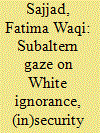|
|
|
Sort Order |
|
|
|
Items / Page
|
|
|
|
|
|
|
| Srl | Item |
| 1 |
ID:
192991


|
|
|
|
|
| Summary/Abstract |
Visuals, including photographs and data visualizations, play a crucial role in the politics of EU border security, both as an internal governance tool (e.g. in surveillance) and as an external means of communication/representation (e.g. in photojournalism). Combining scholarship on photographic representations of migration with literature on surveillance technologies and data visualizations, we argue that these visuals interact to reproduce gendered and racialized meanings of migration and border security. Using a feminist postcolonial lens, we develop an intervisual framework for studying how processes of gendering and racialization render subjects, practices and spaces knowable at the intersection between these visuals. We apply this framework to a case study of Frontex’s Risk Analysis Reports (2010–2021) and demonstrate how it is applicable to other security institutions. The intervisual analysis reveals how the migrant Other and (white) European are visually reproduced through: 1) the (in)visibilization of bodies; 2) the ascription and denial of agency; and 3) the spatialization of borders as ‘frontier imaginings’ that oscillate between fortification and expansionism. The intersectional co-constitution of gender and race, we conclude, is central to the visual politics of Frontex, contributing to problematizing migrants and migration and legitimizing violent border practices.
|
|
|
|
|
|
|
|
|
|
|
|
|
|
|
|
| 2 |
ID:
192990


|
|
|
|
|
| Summary/Abstract |
In August 2020, a motor yacht formerly owned by French customs authorities set sail in the Mediterranean Sea in search of migrant boats in distress. Funded by the street artist Banksy, the search and rescue engagement of the Louise Michel was meant to prevent both the continuous loss of migrant lives at sea and mass interceptions to North Africa. Assessing her maiden voyage and strategic conception, as well as her operational and political impact, the article argues that the intervention of the Louise Michel and her activist crew can be regarded as an attempt to disrupt EUrope’s ‘weaponization’ of time in the governance of maritime migration. Over recent years, EU member states have sought to systematically decelerate rescues while accelerating interceptions of escaping migrant boats. With her speed, unprecedented in the ‘civil fleet’ and on a par with EUropean and Libyan naval assets, the activists have sought to disrupt the EUro–Libyan interception regime which has led to the forced return of over 120,000 people to Libya since 2016.
|
|
|
|
|
|
|
|
|
|
|
|
|
|
|
|
| 3 |
ID:
192992


|
|
|
|
|
| Summary/Abstract |
The UK government’s e-Borders project presents an intriguing anomaly: despite repeated and acknowledged failings of the project over two decades, it has remained a core part of border strategy across successive administrations. This article seeks to explain the surprising resilience of this programme by developing the concept of political lock-in. We combine insights from critical security studies with science and technology studies concepts of ‘tech hype’ and lock-in. We apply these insights to trace how e-Borders was constructed as a compelling technological solution to pressing security issues. This created a form of political lock-in, whereby the project became impossible to abandon because of its political urgency, despite increasing awareness of its unfeasibility. With the project caught in a liminal state of non-completion, successive governments expanded the scope of the programme by attaching new security problems to it, thereby rendering it even more unviable. Our analysis thus throws up a paradox: rather than mobilizing resources to accomplish its tech vision, securitization created forms of lock-in and paralysis that made the programme more difficult to accomplish.
|
|
|
|
|
|
|
|
|
|
|
|
|
|
|
|
| 4 |
ID:
192989


|
|
|
|
|
| Summary/Abstract |
In this article, I, as a subaltern, offer a reverse gaze on White security plans to rescue the world from the tide of violent extremism. Violent extremism has been identified as a global security threat by the United Nations, which announced a Plan of Action to combat the threat in 2016. Education has been considered a valuable tool for preventing violent extremism. In 2017, UNESCO published a policy guide explaining how education can be used to prevent violent extremism. This article offers a critique of the UNESCO policy guide, using the construct of White ignorance as explained by Charles Mills and Jennifer Mueller’s Theory of Racial Ignorance. This critique, coming from a location (Pakistan) where education has been under intense White scrutiny since 9/11, owing to its alleged link with violent ideologies, provides an inverse perspective on the problem of violent extremism. Using Mills’s concept of the epistemology of ignorance, I argue that international security policies view security as maintenance of White hegemony and refuse to listen to the people labelled as a security problem by White epistemic authorities. I contend that it is the White security policy that needs to be educated to prevent violence and maintain durable security.
|
|
|
|
|
|
|
|
|
|
|
|
|
|
|
|
| 5 |
ID:
192988


|
|
|
|
|
| Summary/Abstract |
This article examines the #SdScandal: the backroom and public fracas surrounding an article on epistemic racism in classic securitization theory that we authored. It argues that what the #SdScandal illustrates is that disciplinary whiteness in international relations has been upheld not despite, but in part through, the ‘critical turn’. Using textual analysis as well as cyber-ethnographic and auto-ethnographic methods, it details how post-positivist knowledge-frames sometimes become vehicles for the rehabilitation of racial-colonial concepts, and how white femininities and novel tender masculinities can be evoked in the defence of institutional hierarchies. That such gendered shifts in disciplinary whiteness (seem to) depart from old-guard ‘white man’s IR’ (per Lake, 2016) only increases their efficacy in securing the status quo. The article further contextualizes this argument about international relations within the broad backlash against resurgent claims for racial justice both inside and outside the academy. It identifies political-intellectual convergences, not only between orthodox and some critical thought, but between right-wing and some self-identified liberal, leftist and/or feminist scholars, especially around the supposed threat of ‘cancellation’ of scholars and scholarship. Examining what critics of the #SdScandal called threats of retribution against this journal, it argues that at stake are issues of editorial independence and academic freedom, and, more broadly, contending visions of how to pursue anti-racism.
|
|
|
|
|
|
|
|
|
|
|
|
|
|
|
|
|
|
|
|
|